SWEDISH
SOUTH ASIAN STUDIES NETWORK
Newsletter 121:
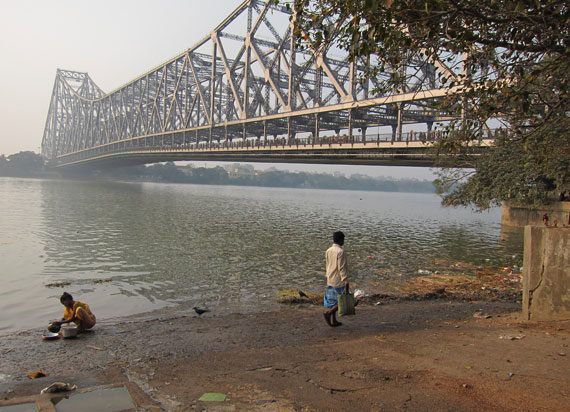 18 March 2011
18 March 2011
| Educational News |
| Lectures and seminars |
| Business and Politics |
| South Asia related Culture |
| New and updated information |
• Seminars, concerts, exhibitions and film shows at Tagore Week in Lund
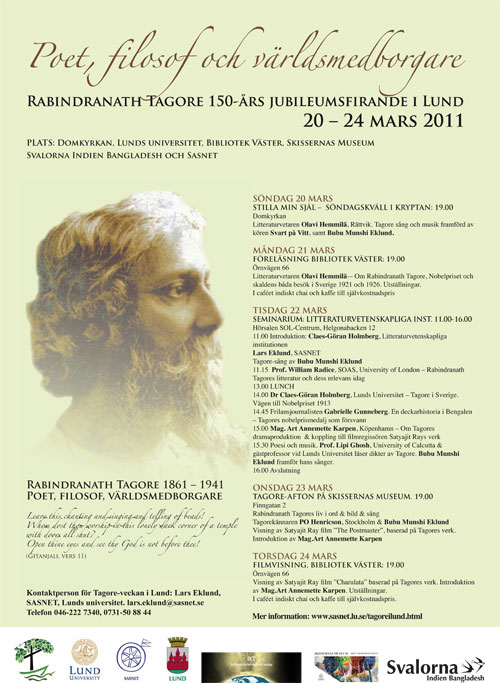 SASNET organises a Rabindranath Tagore 150th birth anniversary celebration week in Lund 20–24 March 2011. In collaboration with other local institutions and organisations, the week includes popular lectures by Swedish experts on Rabindranath’s life and literature, as well as exhibitions, film shows, concerts and poetry reading.
SASNET organises a Rabindranath Tagore 150th birth anniversary celebration week in Lund 20–24 March 2011. In collaboration with other local institutions and organisations, the week includes popular lectures by Swedish experts on Rabindranath’s life and literature, as well as exhibitions, film shows, concerts and poetry reading.
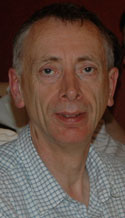 On Tuesday 22 March, SASNET and Lund University also organise an academic seminar, featuring Prof. Wiliam Radice (photo) from SOAS, University of London. Prof. Radice, who has made new inspiring translations of Tagore’s poetry and prose from Bengali into English, will speak about the relevance still present in his literature.
On Tuesday 22 March, SASNET and Lund University also organise an academic seminar, featuring Prof. Wiliam Radice (photo) from SOAS, University of London. Prof. Radice, who has made new inspiring translations of Tagore’s poetry and prose from Bengali into English, will speak about the relevance still present in his literature.
The seminar programme also includes lectures by Dr. Claes-Göran Holmberg, Comparative Literature, Centre for Languages and Literature, who will talk about ”Tagore in Sweden and the Nobel Prize of 1913”, and Mag. Art Annemette Karpen from Copenhagen who will talk abot ”Tagore’s Drama Production, and Satyajit Ray’s films based on Tagore works”. Prof. Lipi Ghosh from Calcutta University, and currently ICCR guest professor at Lund University, will recite poems by Rabindranath Tagore, and Bubu Munshi Eklund will sing some of his songs.
Full information about the March 2011 Tagore Week in Lund.
Other Tagore seminars will take place in September 2011 in collaboration with the Indian embassies in Scandinavia, and with support from the Indian Council for Cultural Relations (ICCR). Leading South Asian Tagore scholars have already been invited for these occasions to be held also in Copenhagen, Stockholm and Uppsala. More information will follow in due time.
• Zoya Hasan keynote speaker at SASNET
seminar on
Managing Diversity: The Indian Experience
 SASNET
organises a full-day seminar on "Managing Diversity: The Indian Experience",
in collaboration with the Embassy of India in Stockholm on Thursday 14 April 2011, 09.30–17.00
and with a concluding cultural programme from 17.30–19.30.
Venue for the seminar:
Pictura hall, 3rd floor, Main University Building (Universitetshuset), Paradisgatan 2, Lund.
SASNET
organises a full-day seminar on "Managing Diversity: The Indian Experience",
in collaboration with the Embassy of India in Stockholm on Thursday 14 April 2011, 09.30–17.00
and with a concluding cultural programme from 17.30–19.30.
Venue for the seminar:
Pictura hall, 3rd floor, Main University Building (Universitetshuset), Paradisgatan 2, Lund.
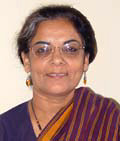 The keynote speaker is
Professor Zoya Hasan (photo to the left) from the Centre for Political Studies at Jawaharlal Nehru University (JNU) in Delhi. She will introduce the theme for the day, ”Managing Diversity: The Indian Experience”.
The keynote speaker is
Professor Zoya Hasan (photo to the left) from the Centre for Political Studies at Jawaharlal Nehru University (JNU) in Delhi. She will introduce the theme for the day, ”Managing Diversity: The Indian Experience”.
Inaugural addresses will be given by
H.E. Ashok Sajjanhar,
Ambassador of India to Sweden and Latvia, and H.E. Mr. Göran Tunhammar, the Governor of Skåne County (Landshövding).
The academic speakers include Professor Sushil Khanna (photo to the left),
Indian Institute of Management Kolkata (but currently ICCR guest Professor at the Asia Research Centre, Copenhagen Business School; Dr. Stig Toft Madsen, Nordic Institute of Asian Studies (NIAS), Copenhagen; Dr. Christina Nygren,
Visiting Research Fellow, Dept. of Oriental Languages, Stockholm University;
and Professor Staffan Lindberg, Dept. of Sociology, Lund University.
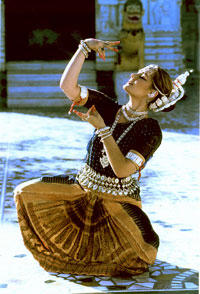 In the afternoon session devoted to business, Mr. Ulf Pehrsson,
Vice President, Government and Industry Relations at Ericsson, will give a presentation on ”Doing business in India”. Finally, SASNET’s director, Dr. Anna Lindberg will round off the seminar by heading a short summary session on ”Managing Diversity: The Indian Experience”.
In the afternoon session devoted to business, Mr. Ulf Pehrsson,
Vice President, Government and Industry Relations at Ericsson, will give a presentation on ”Doing business in India”. Finally, SASNET’s director, Dr. Anna Lindberg will round off the seminar by heading a short summary session on ”Managing Diversity: The Indian Experience”.
The seminar is organised as part of Lund City’s ongoing (11-17 April 2011) Round of Integration and Multitude (Lunds Integrations- och Mångfaldsrunda).
More information on this initiative.
From 17.30, a cultural and social programme wil be held at the Old Bishop’s House (Gamla Biskopshuset), Biskopsgatan 1, Lund. It is being hosted by the Embassy of India in Sweden.
Anette Pooja (photo to the right) from Gothenburg will perform a classical Odissi dance performance, and Ms. Sri Kripa will sing.
Registration for the seminar and the cultural programme should be made by sending an e-mail to Lars.Eklund@sasnet.lu.se not later than Friday 8 April 2011.
More information about the 14th April SASNET seminar.
• Anna Lindberg part of Lund University delegation to India
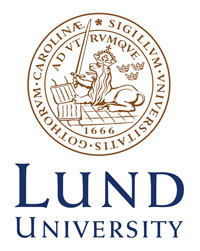 A high-level multi-disciplinary delegation from Lund University, led by Pro Vice-Chancellor Dr Eva Åkesson visits India on 21-25 March 2011. The reasons for the visit, partially planned for by the Swedish Embassy in New Delhi, are the already substantial collaborations with India and expectations of further increased cooperation in the coming years. The delegation consists of deans and outstanding scientists, representing several of Lund University's faculties, and they visit universities in Delhi, Mumbai and Kanpur. SASNET’s Director, Dr. Anna Lindberg is a member of the delegation.
A high-level multi-disciplinary delegation from Lund University, led by Pro Vice-Chancellor Dr Eva Åkesson visits India on 21-25 March 2011. The reasons for the visit, partially planned for by the Swedish Embassy in New Delhi, are the already substantial collaborations with India and expectations of further increased cooperation in the coming years. The delegation consists of deans and outstanding scientists, representing several of Lund University's faculties, and they visit universities in Delhi, Mumbai and Kanpur. SASNET’s Director, Dr. Anna Lindberg is a member of the delegation.
• Lars Eklund back at office, Julia Velkova gets new SASNET assignment
SASNET’s deputy director Lars Eklund spent six weeks in India, but is now back at office. During Lars’ absence from SASNET, Ms. Julia Velkova worked as Acting Deputy Director for SASNET. Julia has a keen interest in developing the relations between South Asia and Europe, as well as working with projects for social change through art and technology. She has therefore now been engaged by SASNET to do development work on our web site. Big changes are expected to happen during 2011. Julia will also be in charge of the coming 2011 Falsterbo conference for young Nordic scholars, that is now being planned for in close collaboration with the Nordic Institute of Asian Studies (NIAS) in Copenhagen.
 |
• Time to submit abstacts for the 2011 Falsterbo conference
The First Call for Papers for the Third Nordic Conference on South Asian Studies for Young Scholars has been published. The Swedish South Asian Studies Network (SASNET) and the Nordic Institute of Asian Studies (NIAS) are organizing the Third Nordic Conference on South Asian Studies for Young Scholars to be held from 16–18 August 2011 in Falsterbo, Sweden. The conference will be a gathering of graduate students and postdocs, along with other junior scholars affiliated with universities in the Nordic countries (Denmark, Finland, Norway, and Sweden) who are focusing on South Asia in their work.
 Keynote speaker this year will be Professor Patricia Jeffery from the School of Social and Political Science from the
University of Edinburgh, UK. The conference is interdisciplinary and this year's main topics will be – Gender Issues; – Climate Change; – Mentality and Local Culture; – ICT and Development, as well as – Alternative Career paths beyond the academia, with a focus on the South Asian region.
Keynote speaker this year will be Professor Patricia Jeffery from the School of Social and Political Science from the
University of Edinburgh, UK. The conference is interdisciplinary and this year's main topics will be – Gender Issues; – Climate Change; – Mentality and Local Culture; – ICT and Development, as well as – Alternative Career paths beyond the academia, with a focus on the South Asian region.
The previous two conferences differed from the usual academic conferences in paying attention explicitly to students. Positive evaluations were received from all participants and we are looking forward to having a productive and engaging event this year!
Deadline for submitting an abstract with a current or projected research project is 15 April 2011. Note: those studying for their masters, Ph.D. candidates, and postdoctoral researchers in all disciplines who are affiliated with Nordic universities are invited to apply. However, if space permits, young scholars from other European Universities will also be welcome, so are also encouraged to send in an application at this time.
More information on the 2011 conference web page.
• SASNET/Lund University seminar on experiences from Dharavi slums project
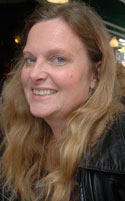 Associate Professor Maria Lantz from the Dept. of Art & Architecture at Royal University College of Fine Arts (KKH), Stockholm, holds a SASNET/Lund University seminar on Thursday 31 March 2011, 09.15–12.00. Her lecture is entitled ”Informal Cities” and is based on a 2008 book about the Dharavi slums in Mumbai, India, produced by Dr. Lantz and colleagues at KKH in collaboration with local organisations. The name of the book was ”Dharavi: Documenting Informalities” (more information).
Associate Professor Maria Lantz from the Dept. of Art & Architecture at Royal University College of Fine Arts (KKH), Stockholm, holds a SASNET/Lund University seminar on Thursday 31 March 2011, 09.15–12.00. Her lecture is entitled ”Informal Cities” and is based on a 2008 book about the Dharavi slums in Mumbai, India, produced by Dr. Lantz and colleagues at KKH in collaboration with local organisations. The name of the book was ”Dharavi: Documenting Informalities” (more information).
The seminar is hosted by the Division of Housing Development and Management, Dept. of Architecture
and Built Environment, Lund University. Venue for the seminar: Design Lilla Hörsalen (DC:Lhö), Ingvar Kamprad Design Centre, Sölvegatan 26, Lund.
• More information about SASNET and its
activities
See SASNET’s page, http://www.sasnet.lu.se/sasnet.html
• Panel suggestions welcome for the 2012 EASAS conference in Lisbon
 The 22nd European Conference on South Asian Studies (ECSAS) is scheduled for 25-28 July 2012 at the University Institute of
Lisbon (also known as ISCTE-IUL) in Portugal. The main conference organiser is Professor Rosa Maria Perez, of the Department of Anthropology, supported by a local scientific steering committee. The venue of the conference will be on the university’s main campus in Lisbon.
The 22nd European Conference on South Asian Studies (ECSAS) is scheduled for 25-28 July 2012 at the University Institute of
Lisbon (also known as ISCTE-IUL) in Portugal. The main conference organiser is Professor Rosa Maria Perez, of the Department of Anthropology, supported by a local scientific steering committee. The venue of the conference will be on the university’s main campus in Lisbon.
The biannual ECSAS conference is the largest gathering of South Asia oriented researchers in Europe, covering all fields from the humanities and social sciences to technology, natural sciences and medicine. The conference is held biannually under the aegis of the European Association of South Asian Studies (EASAS), a professional, non-profit organisation of scholars engaged in research and teaching concerning South Asia with regard to all periods and fields of study. (SASNET organised the 18th ECMSAS conference in Lund in 2004.)
Suggestions for panels are currently accepted for the Lisbon conference. They should be sent as Word documents to ecsas22@ed.ac.uk, and include: – Panel name (tentative): – Panel description (100 words maximum): – Your name, postal and email address: – Your professional affiliation: – List of participants (tentative). Deadline for panel suggestions is 15 April 2011.
The steering committee will then meet in May to decide on the panels to be accepted, and the selected panels will be presented most probably towards the end of May 2011.
Full information on the conference page.
• Two Swedish university representatives in the EASAS Council
![]() The European Association of South Asian Studies (EASAS) is governed by a Council, headed by
Professor Roger Jeffery, University of Edinburgh. He was re-elected President at latest General Meeting of EASAS, that was held 27 July 2010 in connection with the
ECSAS conference at the University of Bonn. At the same time, Dr Margret Frenz, University of Leicester and Edinburgh, was re-elected Vice-President, and Professor Ulrike Müller-Böker, University of Zurich, was elected Treasurer. Besids these office-holders, the EASAS Council also consists of six other members, out of which two are based at Swedish universities, namely Dr. Anna Lindberg, SASNET, Lund University; and Dr Heinz-Werner Wessler, Uppsala University. The other four members are Dr Nicolas Jaoul, École des Hautes Études en Sciences Sociales, Paris; Professor Rosa Maria Perez, ISCTE-IUL, Lisbon;
Dr Danuta Stasik, University of Warsaw; and Dr John Zavos, University of Manchester. Their next meeting will be in Paris 1–2 April 2011.
The European Association of South Asian Studies (EASAS) is governed by a Council, headed by
Professor Roger Jeffery, University of Edinburgh. He was re-elected President at latest General Meeting of EASAS, that was held 27 July 2010 in connection with the
ECSAS conference at the University of Bonn. At the same time, Dr Margret Frenz, University of Leicester and Edinburgh, was re-elected Vice-President, and Professor Ulrike Müller-Böker, University of Zurich, was elected Treasurer. Besids these office-holders, the EASAS Council also consists of six other members, out of which two are based at Swedish universities, namely Dr. Anna Lindberg, SASNET, Lund University; and Dr Heinz-Werner Wessler, Uppsala University. The other four members are Dr Nicolas Jaoul, École des Hautes Études en Sciences Sociales, Paris; Professor Rosa Maria Perez, ISCTE-IUL, Lisbon;
Dr Danuta Stasik, University of Warsaw; and Dr John Zavos, University of Manchester. Their next meeting will be in Paris 1–2 April 2011.
More information.
• Nordic research funding available for exploratory workshops
 The Joint Committe for Nordic research councils in the Humanities and Social Sciences (NOS-HS) is a cooperation between the research councils in Denmark, Finland, Iceland, Norway and Sweden responsible for research within the Humanities and Social Sciences. Since 1 January 2011, the NOS-HS secretariat is based in Norway.
The Joint Committe for Nordic research councils in the Humanities and Social Sciences (NOS-HS) is a cooperation between the research councils in Denmark, Finland, Iceland, Norway and Sweden responsible for research within the Humanities and Social Sciences. Since 1 January 2011, the NOS-HS secretariat is based in Norway.
The main purposes of NOS-HS are to promote strategic co-operation between the Nordic research councils as well as between the research councils and other Nordic and international bodies.
In 2008 and 2010, calls were given for applications in support of major Nordic Collaborative Research Projects (NORDCORP). One of the projects selected in 2008 had a South Asia focus, namely a project on ”Sikh Identity Formation: Generational Transfer of traditions in the Nordic Countries”, carried out by Kristina Myrvold, Lund University; Knut A. Jacobsen, University of Bergen; Ravinder Kaur, Roskilde University; and Hanna Snellman, University of Helsinki. More information on the NORDCORP projects.
In order to promote the development of new and innovative research areas and programmes within the humanities and social sciences in the Nordic countries, NOS-HS also supports series of exploratory workshops held in the Nordic countries. NOS-HS expects to support approximately 13 series of exploratory workshops to be held in 2011 and/or 2012. A series of exploratory workshops should comprise two to three separate workshops that focus on a specific scientific theme. Each workshop is typically held over a period of one to three days. The workshops should have an innovative aspect, and be submitted by a principal applicant together with, as a minimum, two co-applicants from two different Nordic countries, thereby representing at least three institutions in three different Nordic countries. Deadline for applications is 13 April 2011. Full information.
• SYDASIEN is no more – SYDASIEN.SE has been born
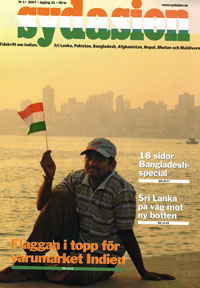 For 34 years the Swedish-language magazine SYDASIEN played an important role to disseminate news and information on South Asia. With popularly written articles on politics, history, literature and culture in the eight countries that consist South Asia (Afghanistan, Bangladesh, Bhutan, India, Maldives, Nepal, Pakistan and Sri Lanka) SYDASIEN was a unique feature in Scandinavia till the magazine closed down in late 2010.
For 34 years the Swedish-language magazine SYDASIEN played an important role to disseminate news and information on South Asia. With popularly written articles on politics, history, literature and culture in the eight countries that consist South Asia (Afghanistan, Bangladesh, Bhutan, India, Maldives, Nepal, Pakistan and Sri Lanka) SYDASIEN was a unique feature in Scandinavia till the magazine closed down in late 2010.
SYDASIEN also had a strong connection to SASNET: Prof. Staffan Lindberg, SASNET’s first director was one of the founding fathers of the magazine back in 1976, and Lars Eklund, SASNET’s current deputy director was the chief editor of the magazine for 25 years, from 1982 till 2007.
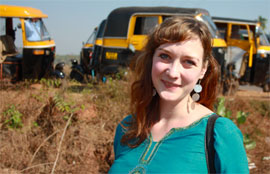 However, SYDASIEN has now resurfaced in a new shape, as a Internet based web magazine. SYDASIEN.SE was officially launched on 1 March 2011 by the new editor of the magazine, Ms. Johanna Sommansson (photo). She has an MA in Social Anthropology and a BA in Indology from Stockholm University on her qualification list. Johanna is currently living in India along with her husband Niklas Sommansson, a web designer who has actually created the new web site. Go for the new SYDASIEN.SE.
However, SYDASIEN has now resurfaced in a new shape, as a Internet based web magazine. SYDASIEN.SE was officially launched on 1 March 2011 by the new editor of the magazine, Ms. Johanna Sommansson (photo). She has an MA in Social Anthropology and a BA in Indology from Stockholm University on her qualification list. Johanna is currently living in India along with her husband Niklas Sommansson, a web designer who has actually created the new web site. Go for the new SYDASIEN.SE.
• Knowledge Must introduces India Summer Program
 In the summer 2011, Knowledge Must introduces a new India Summer Program. This project offers a four weeks program with intensive Hindustani (Hindi/Urdu) language
training, seminars on Indian Culture, Politics, and Society and unique
excursions and field trips in Delhi, and to Varanasi, Rishikesh, and Alwar. The Program, open to students and professionals from all
over the world, will run from 17 July to 13 August 2011.
If successful, Knowledge Must plans to organise its India Program twice every year, both summer and winter Program
will become a twice yearly affair (summer/winter).
In the summer 2011, Knowledge Must introduces a new India Summer Program. This project offers a four weeks program with intensive Hindustani (Hindi/Urdu) language
training, seminars on Indian Culture, Politics, and Society and unique
excursions and field trips in Delhi, and to Varanasi, Rishikesh, and Alwar. The Program, open to students and professionals from all
over the world, will run from 17 July to 13 August 2011.
If successful, Knowledge Must plans to organise its India Program twice every year, both summer and winter Program
will become a twice yearly affair (summer/winter).
Knowledge Must is
a New Delhi and Berlin based organisation assisting students, professionals, and organisations to cross cultural boundaries, mainly between South Asia and the Western world. Since earlier, it offers career counselling, study and work experience, language immersion, culture-specific and process-oriented training, individualized travel arrangements, and intercultural events (more information about Knowledge Must).
Knowledge Must also runs a weblog, discussing global and intercultural communication, cultural exchange, and intercultural issues, especially between India/South Asia and the Western world.
More information on the India Summer Program 2011.
• Northeast India Study Circle 2011 to be held in Guwahati
 Indian Formation Research Society organises a Northeast India Study Circle, 18 June - 19 July 2011 in Guwahati, Assam, India. The study circle is an annual gathering of activists and scholars with keen interest in studying the politics and scholarship of the Northeast of India (including the states of Arunachal, Assam, Manipur, Mehalaya, Mizoram,
Nagaland and Tripura). The circle is aimed at all who are concerned with empirically-substantiated pro-people studie. It is important to know that the study circle will not be done in an academic or university setting, neither in a hotel environment, but studying alongside local activists and scholars. The daily program will consist of expert led seminar presentations and discussions or research site visits. The study circle is funded explicitly through participants' fees. For further information and submission of an expression of interest, please email critical.india@gmail.com and provide details of your work/studies and why you are interested in the study circle. More information.
Indian Formation Research Society organises a Northeast India Study Circle, 18 June - 19 July 2011 in Guwahati, Assam, India. The study circle is an annual gathering of activists and scholars with keen interest in studying the politics and scholarship of the Northeast of India (including the states of Arunachal, Assam, Manipur, Mehalaya, Mizoram,
Nagaland and Tripura). The circle is aimed at all who are concerned with empirically-substantiated pro-people studie. It is important to know that the study circle will not be done in an academic or university setting, neither in a hotel environment, but studying alongside local activists and scholars. The daily program will consist of expert led seminar presentations and discussions or research site visits. The study circle is funded explicitly through participants' fees. For further information and submission of an expression of interest, please email critical.india@gmail.com and provide details of your work/studies and why you are interested in the study circle. More information.
• SOAS announces three India related Post-Doctoral Research Assistants
 The School of Oriental and African Studies (SOAS), University of London, announces three positions as Post-Doctoral Research Assistants in Social Anthropology for a ESRC funded project on ”Rural Change and Anthropological Knowledge in Post-Colonial India: A Comparative Study”. The positions will be for 32 months, during the period 1 September 2011 to 30 April 2014. The research assistants will examine social and economic change in post-colonial Indian villages. Through intensive new ethnographic fieldwork, the post-doctoral researchers will ‘restudy’ one of three villages originally studied independently in the early 1950s by F.G. Bailey, Adrian C. Mayer and David F. Pocock (deceased) in Orissa (Odisha), Madhya Pradesh and Gujarat respectively. Bailey and Mayer – both now in their late 80s – will contribute their field materials and experience to the research.
Deadline for applications is Monday 21 March 2011. More information.
The School of Oriental and African Studies (SOAS), University of London, announces three positions as Post-Doctoral Research Assistants in Social Anthropology for a ESRC funded project on ”Rural Change and Anthropological Knowledge in Post-Colonial India: A Comparative Study”. The positions will be for 32 months, during the period 1 September 2011 to 30 April 2014. The research assistants will examine social and economic change in post-colonial Indian villages. Through intensive new ethnographic fieldwork, the post-doctoral researchers will ‘restudy’ one of three villages originally studied independently in the early 1950s by F.G. Bailey, Adrian C. Mayer and David F. Pocock (deceased) in Orissa (Odisha), Madhya Pradesh and Gujarat respectively. Bailey and Mayer – both now in their late 80s – will contribute their field materials and experience to the research.
Deadline for applications is Monday 21 March 2011. More information.
• Leiden announces fellowships in the field of Asian Traditions and Modernities
 Three PhD fellowships and one post-doc in the field of Asian Traditions and Modernities announced at the Institute for Area Studies at the University of Leiden. The applicants are expected to suggest a research topic with focus on some of the following themes: - Asia in the international system (in particular the emergence of India and China as regional hegemons); – Power and limits of the Asian state; –
Asian debates on history and modernity; – New and old diversities in Asia; – Production and flow of modern Asian cultures. Deadline to submit online applications is 1 April 2011. More information about the PhD fellowships and the the post-doc fellowship.
Three PhD fellowships and one post-doc in the field of Asian Traditions and Modernities announced at the Institute for Area Studies at the University of Leiden. The applicants are expected to suggest a research topic with focus on some of the following themes: - Asia in the international system (in particular the emergence of India and China as regional hegemons); – Power and limits of the Asian state; –
Asian debates on history and modernity; – New and old diversities in Asia; – Production and flow of modern Asian cultures. Deadline to submit online applications is 1 April 2011. More information about the PhD fellowships and the the post-doc fellowship.
• Göttingen announces Fellowship in Indian Religions
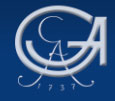 The Centre for Modern Indian Studies at the Georg-August-Universität
Göttingen is currently inviting applications for a Postdoctoral Fellow in Indian Religions. The position will start on 1 October 2011. Applications from scholars representing all subfields in the study of
religions in India are welcome; preference will be given to candidates whose
research and writing addresses one or more of the following topics: minority
religions, law, conversion, gender, social inequality, religion and empire,
and religion and democratic practice. Applicants must have a PhD in
Religious Studies or in allied fields including History, Anthropology,
Sociology, Literature, and Political Science. In addition to pursuing a
postdoctoral research project, the fellow will assist in the design and
organization of international conferences on Indian religions, and in the
teaching of religion courses at the Centre for Modern Indian Studies. Applications should be sent by e-mail to Prof. Rupa Viswanath no later than April 8, 2011.
The Centre for Modern Indian Studies at the Georg-August-Universität
Göttingen is currently inviting applications for a Postdoctoral Fellow in Indian Religions. The position will start on 1 October 2011. Applications from scholars representing all subfields in the study of
religions in India are welcome; preference will be given to candidates whose
research and writing addresses one or more of the following topics: minority
religions, law, conversion, gender, social inequality, religion and empire,
and religion and democratic practice. Applicants must have a PhD in
Religious Studies or in allied fields including History, Anthropology,
Sociology, Literature, and Political Science. In addition to pursuing a
postdoctoral research project, the fellow will assist in the design and
organization of international conferences on Indian religions, and in the
teaching of religion courses at the Centre for Modern Indian Studies. Applications should be sent by e-mail to Prof. Rupa Viswanath no later than April 8, 2011.
More information on CeMIS and the Indian Religions Research Group.
• More information about South Asia related
research at Swedish and Nordic universities
See SASNET’s page, http://www.sasnet.lu.se/research.html
• India’s education budget higher by 24 %
 India’s 2011 budget hikes spending on higher education with 24% compared to last year to US$2.9 billion for 2011-12. The new budget was presented by Finance Minister Pranab Mukherjee on 28 February 2011. Most of the increased allocation is for projects already in the pipeline rather than for ambitious plans to expand the number of higher education institutions in the coming years. A major portion of the money for higher education will go to the 15 Indian Institutes of Technology (IITs), which will receive $1.25 billion, followed by the University Grants Commission, the regulatory body for higher education, which will receive $1.16 billion.
India’s 2011 budget hikes spending on higher education with 24% compared to last year to US$2.9 billion for 2011-12. The new budget was presented by Finance Minister Pranab Mukherjee on 28 February 2011. Most of the increased allocation is for projects already in the pipeline rather than for ambitious plans to expand the number of higher education institutions in the coming years. A major portion of the money for higher education will go to the 15 Indian Institutes of Technology (IITs), which will receive $1.25 billion, followed by the University Grants Commission, the regulatory body for higher education, which will receive $1.16 billion.
However, the increase falls short of the nearly 100% hike in higher education funding that the Education Ministry was pushing for to meet a slew of promises made under the country's 2007-12 Five Year Plan. India's National Knowledge Commission has e g estimated that India needs 1,500 universities compared to around 370 now.
More information on the Indian 2011 education budget, in an article by Alya Mishra,
World University News 13 March 2011.
• Copenhagen Summer University programme on Decoding India
 As part of the 2011 Copenhagen Summer University academic programme, a 3-day course entitled ”Decoding India! – How to make Sense of a Paradox” will be held 15 – 17 August 2011 at the University of Copenhagen, Frederiksberg Campus. This course aims to open the theme of India's rise as a global power and the paradoxes that underpin the phenomenon. It offers an insight into the fast transforming social-political landscape both conceptually and empirically. The workshop sessions will focus on the structures and forms of ‘power' and the ways in which cultural signs - social status, ‘connections' and ‘clout' across religion, caste and ethnic divides - of power are recognized and practiced. It is aimed at businesses, media, NGOs and foreign policymakers who interact with 'Official India', and seek to acquire and enhance their understanding of the cultural underpinnings of this interaction. The course director is Associate Professor Ravinder Kaur, Department of Cross-cultural and Regional Studies, University of Copenhagen. Deadline for registration is Tuesday 24th May 2011. More information.
As part of the 2011 Copenhagen Summer University academic programme, a 3-day course entitled ”Decoding India! – How to make Sense of a Paradox” will be held 15 – 17 August 2011 at the University of Copenhagen, Frederiksberg Campus. This course aims to open the theme of India's rise as a global power and the paradoxes that underpin the phenomenon. It offers an insight into the fast transforming social-political landscape both conceptually and empirically. The workshop sessions will focus on the structures and forms of ‘power' and the ways in which cultural signs - social status, ‘connections' and ‘clout' across religion, caste and ethnic divides - of power are recognized and practiced. It is aimed at businesses, media, NGOs and foreign policymakers who interact with 'Official India', and seek to acquire and enhance their understanding of the cultural underpinnings of this interaction. The course director is Associate Professor Ravinder Kaur, Department of Cross-cultural and Regional Studies, University of Copenhagen. Deadline for registration is Tuesday 24th May 2011. More information.
• Leiden Summer School in Languages and Linguistics offers Indological Programme
 For the sixth year, the Leiden Summer School in Languages and Linguistics at the Faculty of Arts, Leiden University, the Netherlands offers an Indological Programme during the period 18–29 July 2011. The Indological programme consists of four courses: – Features of Vedic poetry , and – The syntax of Vedic prose, both courses taught by Dr. Werner Knobl, University of Kyoto, Japan; a course on”Early Saiva Literature, taught by
Peter Bisschop, Leiden University; and a course on ”Readings in Gandhari Buddhist Literature, taught by
Stefan Baums, Leiden University. More information.
For the sixth year, the Leiden Summer School in Languages and Linguistics at the Faculty of Arts, Leiden University, the Netherlands offers an Indological Programme during the period 18–29 July 2011. The Indological programme consists of four courses: – Features of Vedic poetry , and – The syntax of Vedic prose, both courses taught by Dr. Werner Knobl, University of Kyoto, Japan; a course on”Early Saiva Literature, taught by
Peter Bisschop, Leiden University; and a course on ”Readings in Gandhari Buddhist Literature, taught by
Stefan Baums, Leiden University. More information.
• IIAS Summer Programme on Heritage Conserved and Contested
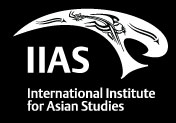 In June 2011, the International Institute for Asian Studies (IIAS) in Netherlands organises its first Summer Programme in Asian Studies. The programme is entitled ”Heritage Conserved and Contested: Asian and European Perspectives”, and is organised in collaboration with Leiden University. The Summer Programme consists of two parts: a four-day masterclass with workshops for PhD-researchers and second year research master students, 20–23 June; and
a two-day PhD conference during which the selected PhD researchers will present their research, 24–25 June. Registration closes on the 15th of January 2011.
In June 2011, the International Institute for Asian Studies (IIAS) in Netherlands organises its first Summer Programme in Asian Studies. The programme is entitled ”Heritage Conserved and Contested: Asian and European Perspectives”, and is organised in collaboration with Leiden University. The Summer Programme consists of two parts: a four-day masterclass with workshops for PhD-researchers and second year research master students, 20–23 June; and
a two-day PhD conference during which the selected PhD researchers will present their research, 24–25 June. Registration closes on the 15th of January 2011.
Research specialists from various academic backgrounds (social anthropology, history, archaeology, conservation studies including cultural resource management) will combine their expertise to provide participants with an intensive – yet interactive – experience. The theme of cultural heritage touches upon a wide array of knowledge forms and traditions (including those of local actors) while it also links theoretical frameworks with applied and policy-relevant knowledge and action. The programme will be run by two world-renown scholars in the fields of cultural heritage theory and cultural Asian history, respectively: Prof. Michael Herzfeld (Harvard University) and Prof. Nira Wickramasinghe (Leiden University). More information.
• More information about South Asia related
education at Swedish and Nordic universities
See SASNET’s page, http://www.sasnet.lu.se/education.html
• Kolkata conference on Development, Logistics and
Governance
![]() The Fourth Critical Studies Conference on Development, Logistics and
Governance will be held 8-10 September 2011 in Kolkata, India. It is organised by the Mahanirban Calcutta Research Group (CRG or the Calcutta Research
Group) in collaboration with various other institutions. During the last six years three critical studies conferences have been held. Thus time it is being planned for in collaboration with the University of Western
Sydney, Australia and the University of Bologn, Italy. The conference will be preceded by a special workshop on
The Fourth Critical Studies Conference on Development, Logistics and
Governance will be held 8-10 September 2011 in Kolkata, India. It is organised by the Mahanirban Calcutta Research Group (CRG or the Calcutta Research
Group) in collaboration with various other institutions. During the last six years three critical studies conferences have been held. Thus time it is being planned for in collaboration with the University of Western
Sydney, Australia and the University of Bologn, Italy. The conference will be preceded by a special workshop on
Transit Labour, which will engage in a comparative study of labour in
transit, emergence of new forms of labour, and labour involved in
logistical activities. Deadline for sending proposals and abstracts is 31 March 2011. More information.
• Copenhagen conference on Globalization and Public Sector Reforms in India and China
 An International conference entitled ”Globalization and Public Sector Reforms in India and China” will be held in Copenhagen on 23–24 September 2011. The conference is organized by Kjeld Erik Brødsgaard and Anthony P. D’Costa at the Asia Research Centre, Copenhagen Business School (CBS). It is a follow-up to the December 2009 conference on “Globalization and Economic Nationalism in Asia”. The Asia Research Centre now revisits the role of the state, but in a different way. The objective is to firmly grasp the central issues surrounding public sector reform in India and China. The conference calls for empirical papers that are theoretically grounded and directly address the significance of public sector reforms in China and India in the wider political, economic, and social contexts. The organisers also welcome well-positioned industry, sectoral, technological, and national-comparative analysis of public sector reforms.
An International conference entitled ”Globalization and Public Sector Reforms in India and China” will be held in Copenhagen on 23–24 September 2011. The conference is organized by Kjeld Erik Brødsgaard and Anthony P. D’Costa at the Asia Research Centre, Copenhagen Business School (CBS). It is a follow-up to the December 2009 conference on “Globalization and Economic Nationalism in Asia”. The Asia Research Centre now revisits the role of the state, but in a different way. The objective is to firmly grasp the central issues surrounding public sector reform in India and China. The conference calls for empirical papers that are theoretically grounded and directly address the significance of public sector reforms in China and India in the wider political, economic, and social contexts. The organisers also welcome well-positioned industry, sectoral, technological, and national-comparative analysis of public sector reforms.
Keynote speakers include Dr. Parthasarathi Banerjee, Director National Institute of Science and Technology and Development Studies, Government of India, New Delhi; Professor Pranab Bardhan, Department of Economics, University of California, Berkeley; and Professor Manoranjan Mohanty, Department of Political Science, University of Delhi.
Venue:
Copenhagen Business School,
Dalgas Have 15, Frederiksberg (Copenhagen).
More information on the conference web page.
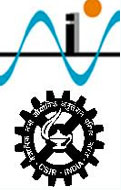 • 7th International Conference on Asian Marine Geology in Goa
• 7th International Conference on Asian Marine Geology in Goa
The 7th International Conference on Asian Marine Geology (ICAMG) will be held from 11 to 14 October 2011 in Goa, India. The first ICAMG was held in Shanghai, China in 1988. So far six ICAMG's have been held in various cities of Asia to promote exchange of ideas and new information on Asian Marine Geology. This is the first ICAMG conference being held in South Asia. All previous ICAMG’s have provided excellent good opportunities for scientist to meet and exchange ideas and share information and to plan for new collaborations. Abstracts should be submitted before 31 July 2011. More information.
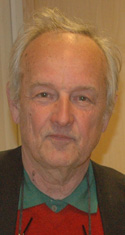 One of the sessions, No 3, focuses on the issue of ”The Illusive Sea Level Threat in the Indian Ocean”, and is convened by Prof. Emeritus Nils-Axel Mörner (photo to the left), Stockholm (previsusly at the Unit of Palegeophysics and Geodynamics, Stockholm University). It will be devoted to observational facts regarding sea level changes, the possible driving forces in climate, the behaviour of glaciers and where to direct the limelight with respect to urgent human problems. The session will most probably be followed by a field trip to one of the islands in the Indian union territory Lakshadweep (Lackadive Islands).
One of the sessions, No 3, focuses on the issue of ”The Illusive Sea Level Threat in the Indian Ocean”, and is convened by Prof. Emeritus Nils-Axel Mörner (photo to the left), Stockholm (previsusly at the Unit of Palegeophysics and Geodynamics, Stockholm University). It will be devoted to observational facts regarding sea level changes, the possible driving forces in climate, the behaviour of glaciers and where to direct the limelight with respect to urgent human problems. The session will most probably be followed by a field trip to one of the islands in the Indian union territory Lakshadweep (Lackadive Islands).
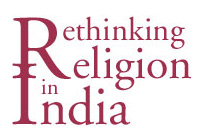 • Third conference on Rethinking Religion in India to be held in Czech Republic
• Third conference on Rethinking Religion in India to be held in Czech Republic
The third conference on ”Rethinking Religion in India” will be organised in Pardubice in the Czech Republic, 11–14 October 2011. It is part of a series of conferences on this topic carried out during a period of five years by a Indo-European research cluster entitled ”Rethinking Religion in India: European
Representations and Indian Responses”.
It is jointly organised by the Research Centre Vergelijkende Cultuurwetenschap, and the India Platform UGent at Ghent University, Belgium; the Centre for the Study of Local Cultures, Kuvempu University, India; and the Karnataka Academy of Social Sciences and Humanities, India. The third conference is organised in collaboration with the Department for the Study of Religions at University of Pardubice, Czech Republic. A call for papers for the Parallel Paper Sessions is open on the
following themes: –The colonial construction of Hinduism; – The caste system and Indian religion; – Secularism in Europe and India; – Said and Orientalism: dead or alive?; – European representations of India; – What does the modernization of Indian traditions mean?; and – Islamic mysticism in European and Indian perspective. Deadline for submissions of abstracts and proposals is June 15th, 2011. More information.
• Time to register for 40th Madison conference
 The 40th Annual Madison Conference on South Asia will be held 20 – 23 October 2011. The conference, that is sponsored by the Center for South Asia at the University of Wisconsin-Madison, attracts over 650 scholars and specialists on South Asia, who travel from countries all over the world and much of the United States. It is a great venue for intellectual, professional, and social exchange. Panels, roundtables, and individual papers on all topics pertaining to South Asian studies are welcome. Registration and proposal submission forms (single papers, panels, roundtables, preconferences) are available on line. Registration as a non-presenting participant at the Conference is open to the general public. The conference features nearly 100 academic panels and roundtables, as well as association meetings and special events ranging from performances to film screenings. Deadline for registration is 1 April 2011. Venue: Madison Concourse Hotel, 1 West Dayton St., Madison, Wisconsin, USA. More information.
The 40th Annual Madison Conference on South Asia will be held 20 – 23 October 2011. The conference, that is sponsored by the Center for South Asia at the University of Wisconsin-Madison, attracts over 650 scholars and specialists on South Asia, who travel from countries all over the world and much of the United States. It is a great venue for intellectual, professional, and social exchange. Panels, roundtables, and individual papers on all topics pertaining to South Asian studies are welcome. Registration and proposal submission forms (single papers, panels, roundtables, preconferences) are available on line. Registration as a non-presenting participant at the Conference is open to the general public. The conference features nearly 100 academic panels and roundtables, as well as association meetings and special events ranging from performances to film screenings. Deadline for registration is 1 April 2011. Venue: Madison Concourse Hotel, 1 West Dayton St., Madison, Wisconsin, USA. More information.
• Dhaka conference on Development Initiatives and Social Movements
An interdisciplinary conference on "Cultural Transformations: Development Initiatives and Social Movements" will be held in Dhaka, Bangladesh on 17 - 18 December 2011. The conference is organised by the Dept. of English and Humanities and BRAC Development Institute at BRAC University and will aim at gathering local and international academics and practitioners to problematise the idea of Asia. A call for papers is open and submissions are accepted by 31 May 2011. The submitted papers should focus on some of the following topics: - Social movements and struggles;- Development initiatives and cultural change; - Asian feminisms and social change;- The post-colonial, the national and the pan-Asian in the formation of new cultural identities, - Changes and developments in popular cultural practices, including music, dance, film and popular literature. Other topics in Inter-Asia Cultural Studies are also welcome. The organisers will provide for the accommodation of the conferencec participants. More information.
• Iowa conferene on Politics of Religion in Asia
![]() A
A![]() n International Conference on "Politics of Religion in Asia" will take place 12 - 13 May 2012 at the University of Iowa, USA and a call for papers is now open. The conference will focus on the development of religion and its role in politics in Asian countries, among which China, Hong Kong, Japan, South Korea, Taiwan, Singapore and India. The conference organisers from the International Programs, University of Iowa will support the participants whose papers are accepted with airfare and lodging, as well as with publishing the papers in an edited volume. Deadline for s
n International Conference on "Politics of Religion in Asia" will take place 12 - 13 May 2012 at the University of Iowa, USA and a call for papers is now open. The conference will focus on the development of religion and its role in politics in Asian countries, among which China, Hong Kong, Japan, South Korea, Taiwan, Singapore and India. The conference organisers from the International Programs, University of Iowa will support the participants whose papers are accepted with airfare and lodging, as well as with publishing the papers in an edited volume. Deadline for s![]() ubmitting proposals is 1 October 2011. More information (as a pdf-file).
ubmitting proposals is 1 October 2011. More information (as a pdf-file).
• 18th International Congress of Rural Health & Medicine to be held at Panjim
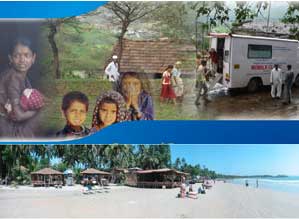 The 18th International Congress of Rural Health & Medicine will be held from 5 - 8 December 2012 at Panjim, Goa. The congress is organised by the Pravara Institute of Medical Sciences at Deemed University, Loni, India, in collaboration with the International Association for Rural Health and Medicine, Japan. The theme will be "Challenges for Health in Global Villages". The congress aims to promote a dialogue among NGOs, academics and government on global issues related to rural health in connection to the achievement of the Millenium Development Goals. Prof. Ingalill Rahm Hallberg, assistant vice chancellor and researcher from Lund University and Prof. Peter Lindqvist from the Swedish Agricultural University in Uppsala are part of the advisory committee comprised of delegates from more than 10 countries. Early bird registration closes on 31 July 2011. For the latest news about the congress check its website.
The 18th International Congress of Rural Health & Medicine will be held from 5 - 8 December 2012 at Panjim, Goa. The congress is organised by the Pravara Institute of Medical Sciences at Deemed University, Loni, India, in collaboration with the International Association for Rural Health and Medicine, Japan. The theme will be "Challenges for Health in Global Villages". The congress aims to promote a dialogue among NGOs, academics and government on global issues related to rural health in connection to the achievement of the Millenium Development Goals. Prof. Ingalill Rahm Hallberg, assistant vice chancellor and researcher from Lund University and Prof. Peter Lindqvist from the Swedish Agricultural University in Uppsala are part of the advisory committee comprised of delegates from more than 10 countries. Early bird registration closes on 31 July 2011. For the latest news about the congress check its website.
More information (as a pdf-file).
• Other conferences connected to South Asian
studies all over the World
See SASNET’s page, http://www.sasnet.lu.se/conferences.html#conf
Important lectures and seminars in Scandinavia
• Tagore lectures by William Radice in Copenhagen and Lund
 Professor William Radice from the School of Oriental and African Studies (SOAS), University of London will give a lecture on "The TAGORE’S LEGACY.
Rabindranath Tagore's Literature and its Relevance in Modern India" on 21 March 2011, 14.00 to 16.00 in Copenhagen and on 22 March 2011, 11.15 – 13.00 in Lund. The lecture in Copenhagen is organised by the Centre of Global South Asian Studies and the Dept. of Cross-cultural and Regional Studies at the University of Copenhagen, while the lecture in Lund is organised by SASNET, Lund University. In his lectures, Prof. Radice will discuss Tagore's relevance to an international readership today and will speculate on the energies that drove Tagore to create his works and whether they were successfully communicated while he was alive. All are welcome, no registration required.
Professor William Radice from the School of Oriental and African Studies (SOAS), University of London will give a lecture on "The TAGORE’S LEGACY.
Rabindranath Tagore's Literature and its Relevance in Modern India" on 21 March 2011, 14.00 to 16.00 in Copenhagen and on 22 March 2011, 11.15 – 13.00 in Lund. The lecture in Copenhagen is organised by the Centre of Global South Asian Studies and the Dept. of Cross-cultural and Regional Studies at the University of Copenhagen, while the lecture in Lund is organised by SASNET, Lund University. In his lectures, Prof. Radice will discuss Tagore's relevance to an international readership today and will speculate on the energies that drove Tagore to create his works and whether they were successfully communicated while he was alive. All are welcome, no registration required.
Venue for the lecture in Copenhagen: Room 0.113, CGSAS, Artillerivej 86, Annexe, 2300 Copenhagen South, Denmark. More information (as a pdf-file).
Venue for the lecture in Lund: Hörsalen, SOL-Centrum, Helgonavägen 12, Lund. More information.
 • Stockholm/Håkan Wahlquist lectures on Bhutanese History, Ethnicity and Current Politics
• Stockholm/Håkan Wahlquist lectures on Bhutanese History, Ethnicity and Current Politics
Mr. Håkan Wahlquist, Curator for the Asian items at the Museum of Far Eastern Antiquities in Stockholm, lectures on Bhutanese History, Ethnicity and Current Politics (”Bhutan: historia, etnicitet och aktuell politik”) at Stockholm University on Wednesday 23 March 2011, 15–17. The seminar is organised by the Department of Oriental Languages, and is part of its regular Wednesday lectures during the spring 2011 focusing on current issues in Asia. Venue: Hall A, Kräftriket 4B, Stockholm University. More information.
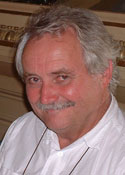 • Uppsala/Peter Schalk lectures on Buddhism among Tamils
• Uppsala/Peter Schalk lectures on Buddhism among Tamils
The Higher Seminar in Indology at Uppsala University invites to a seminar with Prof. Peter Schalk on ”Buddhism among Tamils”, on Wednesday 23 March 2011, 17.00–19.00. Schalk is Chair Professor of History of Religions, especially Hinduism and Buddhism at the Faculty of Theology, Uppsala University. The seminar focuses on the Tamil-speaking Buddhists in southern South Asia from the pre-colonial period through the contemporary period in dialogue and conflict with Tamil Cainam, Caivam, Vaishnavam and worldly powers. These confrontations gave Buddhism among Tamils a special profile, but also marginalised the religion on the religious map in southern South Asia. Venue: Engelska Parken, room 9-3042. More information.
• IFAD
Rural Poverty Report 2011 presented at Lund University seminar
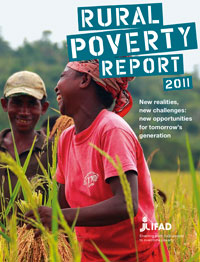 LUCID (Lund University’s Centre of Excellence for Integration of Social and Natural Dimensions of Sustainability) Research School at Lund University invites to a seminar with Edward Heinemann from the
International Fund for Agricultural Development (IFAD) on Friday 25 March 2011, 10.15–12.00. He will present the IFAD
Rural Poverty Report 2011, with the theme ”New realities, new challenges: new opportunities for tomorrow’s generation”.
This is a globally significant report which is released every decade. It provides a coherent and comprehensive look at rural poverty, its global consequences and the prospects for eradicating it.
Released on 6 December 2010, the report contains updated estimates by IFAD regarding how many rural poor people there are in the developing world, poverty rates in rural areas, and the percentage of poor people residing in rural areas. The report also looks at changes to agricultural markets and new opportunities for rural women and men. Go for the Rural Poverty Report 2011.
LUCID (Lund University’s Centre of Excellence for Integration of Social and Natural Dimensions of Sustainability) Research School at Lund University invites to a seminar with Edward Heinemann from the
International Fund for Agricultural Development (IFAD) on Friday 25 March 2011, 10.15–12.00. He will present the IFAD
Rural Poverty Report 2011, with the theme ”New realities, new challenges: new opportunities for tomorrow’s generation”.
This is a globally significant report which is released every decade. It provides a coherent and comprehensive look at rural poverty, its global consequences and the prospects for eradicating it.
Released on 6 December 2010, the report contains updated estimates by IFAD regarding how many rural poor people there are in the developing world, poverty rates in rural areas, and the percentage of poor people residing in rural areas. The report also looks at changes to agricultural markets and new opportunities for rural women and men. Go for the Rural Poverty Report 2011.
Venue for the Lund University seminar: Rio, 4th floor Geocentrum 1, Sölvegatan 10, Lund. More information.
• Uppsala seminar on Linguistic fieldwork in the Himalayas
Dr. Bettina Zeisler from Tübingen University, Germany, lectures at Uppsala University on Monday 28 March 2011, 13.00–16.00. She will talk about ”Linguistic fieldwork in the Himalayas – a survival kit”. The seminar is part of a series of lectures on Linguistic Field Work, organised by the Division
for Linguistics and Computer Lingustics at the Dept. of Linguistics and Philology during the spring 2011. Venue: Engelska Parken, room 7-0043. More information.
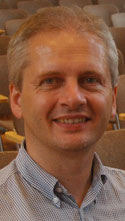 • Uppsala seminar on Translating the holy scriptures of the Sikhs
• Uppsala seminar on Translating the holy scriptures of the Sikhs
The Higher Seminar in Indology at Uppsala University invites to a seminar with Dr. Heinz Werner Wessler on ”Translating the holy scriptures of the Sikhs” on Wednesday 30 March 2011, 17.00–19.00. Dr. Wessler is guest professor in charge of the advanced Hindi courses at the Department of Linguistics
and Philology, Uppsala University. Venue: Engelska Parken, room 9-3042. More information.
• Stockholm lecture giving Insights from the Maoist Revolution in India
 On Monday 4 April 2011, Senior Lecturer, Alpa Shah, from the Dept. of Anthropology, Goldsmiths College, University of London, will hold a guest lecture on "Insights from the Maoist Revolution in India" at Stockhom University. The lecture is organised by the Dept. of Social Anthropology at Stockholm University and is part of its weekly research seminar series that are held every Monday, 13.00 – 15.00, until 30 May 2011. A number of lectures this term are dedicated on South Asia. All are welcome! Venue: Room B600, Dept. of Anthropology, Universitetsvägen 10 B, Frescati.
On Monday 4 April 2011, Senior Lecturer, Alpa Shah, from the Dept. of Anthropology, Goldsmiths College, University of London, will hold a guest lecture on "Insights from the Maoist Revolution in India" at Stockhom University. The lecture is organised by the Dept. of Social Anthropology at Stockholm University and is part of its weekly research seminar series that are held every Monday, 13.00 – 15.00, until 30 May 2011. A number of lectures this term are dedicated on South Asia. All are welcome! Venue: Room B600, Dept. of Anthropology, Universitetsvägen 10 B, Frescati.
More information.
• CISCA workshop on Developing India: Critical approaches
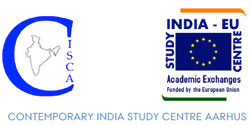 A Workshop on “Developing India: Critical approaches” will be held at the Aarhus University, Denmark, on Tuesday 5 April 2011, 14–16. It is organised by the Contemporary India Study Centre Aarhus (CISCA) at the Department of History and Area Studies, University of Aarhus.
A Workshop on “Developing India: Critical approaches” will be held at the Aarhus University, Denmark, on Tuesday 5 April 2011, 14–16. It is organised by the Contemporary India Study Centre Aarhus (CISCA) at the Department of History and Area Studies, University of Aarhus.
While India is known and widely celebrated – or even feared – for its rapid growth rates in recent years, this seminar will look critically at the question of development. This concerns first and foremost the idea of development (or underdevelopment) as such – to be located in a larger discourse.
Four invited speakers will present one paper each: Dr. Deepak Kumar Behera, Dept. of Anthropology, Sambalpur University, India (and a member of the CISCA board) will talk about ”Impact of Mega Development Projects on Indigenous People of Orissa: An Assessment from Cultural Perspective”; Dr. Jyotirmaya Tripathy from the Dept. of Humanities and Social Sciences, Indian Institute of Technology (IIT) Madras, Chennai, will talk about ”Does Development Exist outside Representation?”; Dr. Sudarsan Padmanabhan, also from IIT Madras, will talk about ”Purusharthas and the Conception of Public Sphere in India”; and Niels Brimnes, Dept. of History and Area Studies, Aarhus Unversity, will talk about ”Two Strategies for Tuberculosis Control in India 1948-65”.
Venue:
Bygning 1328, Lokale 220, Aarhus University, Denmark. More information.
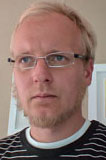 • Uppsala seminar on War and Conflict in Contemporary Pashtoo Short Stories
• Uppsala seminar on War and Conflict in Contemporary Pashtoo Short Stories
The Higher Seminar in Indology at Uppsala University invites to a seminar with Anders Widmark on ”War and Conflict in Contemporary Pashtoo Short Stories” on Wednesday 6 April 2011, 17.00–19.00. Anders is a PhD candidate at the Division of Iranian Languages, Department of Linguistics and Philology, Uppsala
University, working on a doctoral project focusing on Pashto and Persian literature and language. Venue: Engelska Parken, room 9-3042. More information.
• Sushil Khanna lectures at Second Annual ICCR-CBS Lecture in Copenhagen
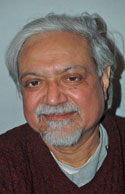 Professor Sushil Khanna, Indian Council of Cultural Relations (ICCR) Visiting Professor at the Asia Research Centre, Copenhagen Business School (CBS), will hold the Second Annual ICCR-CBS Lecture on Monday 11 April 2011, 15.00–17.00. Prof. Khanna will speak about ”Corporate Control and Governance in India”, focusing on the new forms of Corporate Control and Governance against the background of changing Indian business environment – from one of ‘socialist’ goals to celebrating the expansion and internationalization of large private firms. In contrast to the western situation, where the issue of corporate governance is seen as a problem of controlling managers, the bulk of business in India (and in other Asian countries) because they are family owned and managed raise several new issues of control and governance. Khanna argues that concentrated family ownership mitigates some of the problems of governance but raises new ones.
Professor Sushil Khanna, Indian Council of Cultural Relations (ICCR) Visiting Professor at the Asia Research Centre, Copenhagen Business School (CBS), will hold the Second Annual ICCR-CBS Lecture on Monday 11 April 2011, 15.00–17.00. Prof. Khanna will speak about ”Corporate Control and Governance in India”, focusing on the new forms of Corporate Control and Governance against the background of changing Indian business environment – from one of ‘socialist’ goals to celebrating the expansion and internationalization of large private firms. In contrast to the western situation, where the issue of corporate governance is seen as a problem of controlling managers, the bulk of business in India (and in other Asian countries) because they are family owned and managed raise several new issues of control and governance. Khanna argues that concentrated family ownership mitigates some of the problems of governance but raises new ones.
Sushil Khanna is Professor of Economics and Strategic Management at the Indian Institute of Management (IIM) in Kolkata, where he has taught for last 25 years.
Venue for the seminar: Faculty Club (ground Floor), CBS, Dalgas Have 15, Frederiksberg (Copenhagen). Full information.
• Information about South Asia related lectures and seminars
See SASNET's page, http://www.sasnet.lu.se/conferences.html
Business and Politics
• Globe Forum Conference in Stockholm to discuss Innovations Against Poverty
 Globe Forum is an annual international conference held in Stockholm for business leaders, entrepreneurs, academics, political leaders and state actors working in the most dynamic growing markets. The focus of Globe Forum Stockholm 2011, to be held on 11 May 2011, will be looking at many of the existing and upcoming business opportunities in creating sustainable cities.
Globe Forum is an annual international conference held in Stockholm for business leaders, entrepreneurs, academics, political leaders and state actors working in the most dynamic growing markets. The focus of Globe Forum Stockholm 2011, to be held on 11 May 2011, will be looking at many of the existing and upcoming business opportunities in creating sustainable cities.
The
Swedish International Development Cooperation Agency (Sida) is one of Globe Forum's partners. During Globe Forum 2010, its then Director-General Anders Nordström presented Sida’s new public-private collaboration programme entitled ”Business for Development”, B4D. This programme includes a new form of development funding focusing on ”Innovations Against Poverty”.
The Innovation Against Poverty (IAP) project will last for three years with an ambition to stimulate entrepreneurs worldwide to develop and disseminate innovative solutions to combat poverty. It focuses on smaller companies with good ideas, but in need of support to penetrate new markets. Companies can be active in all sectors where innovation leads to poverty reduction, from agriculture and infrastructure to health and education.
At this year's Globe Forum, IAP will be one of the sessions. If you are interested to get updates about IAP you can register your interest by e-mailing info@innovationsagainstpoverty.org
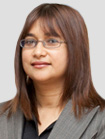
• Farahanaz Faiza first Maldivian Ambassador to Sweden
The new Ambassador of Maldives, Dr. Farahanaz Faizal, is the country's first ambassador in Stockholm. She was born in 1965 and worked in research before entering the Ministry of Foreign Affairs in 2008 as Advisor to the Minister. She has been the High Commissioner of Maldives to the United Kingdom since March 2009. The Ambassador is concurrently accredited from the United Kingdom. She presented her accreditation letters to the Swedish King on 23 February 2011.
• Information about South Asia related business and politics in Sweden
See SASNET's page, http://www.sasnet.lu.se/polbuss.html
South Asia related culture in
Scandinavia
• More information about South Asia related culture
in Sweden/ Scandinavia
See SASNET’s page, http://www.sasnet.lu.se/culture.html
New and updated items on SASNET web site
• Swedish departments where research on
South Asia is going on:
Constantly added to the list of research environments at Swedish
universities, presented by SASNET. The full list now includes 275 departments,
with detailed descriptions of the South Asia related research and education
taking place! Go to http://www.sasnet.lu.se/environment.html
Best regards
Lars Eklund
Deputy director/webmaster
SASNET/Swedish South Asian Studies Network
SASNET is a national network for research, education, and information about South Asia based at Lund University. Its aim is to promote a dynamic networking process in which Swedish researchers co-operate with researchers in South Asia and globally.
The SASNET network is open to all the sciences. Priority is given to interdisciplinary cooperation across faculties, and more particularly to institutions in the Nordic countries and South Asia. SASNET believes that South Asian studies will be most fruitfully pursued as a cooperative endeavour between researchers in different institutions who have a solid base in their mother disciplines.
The network is financed by Lund
University.
Postal address: SASNET – Swedish South Asian Studies Network,
Scheelevägen 15 D, SE-223 70 Lund, Sweden
Visiting address: Ideon Research Park, House Alpha 1 (first floor,
room no. 2040), in the premises of the Centre for East and South
East Asian Studies at Lund University (ACE).
Phone: + 46 46 222 73 40
Fax: + 46 46 222 30 41
E-mail: sasnet@sasnet.lu.se
Web site:
http://www.sasnet.lu.se
SASNET - Swedish South Asian Studies Network/Lund
University
Address: Scheelevägen 15 D, SE-223 70 Lund, Sweden
Phone: +46 46 222 73 40
Webmaster: Lars Eklund
Last updated
2011-04-06